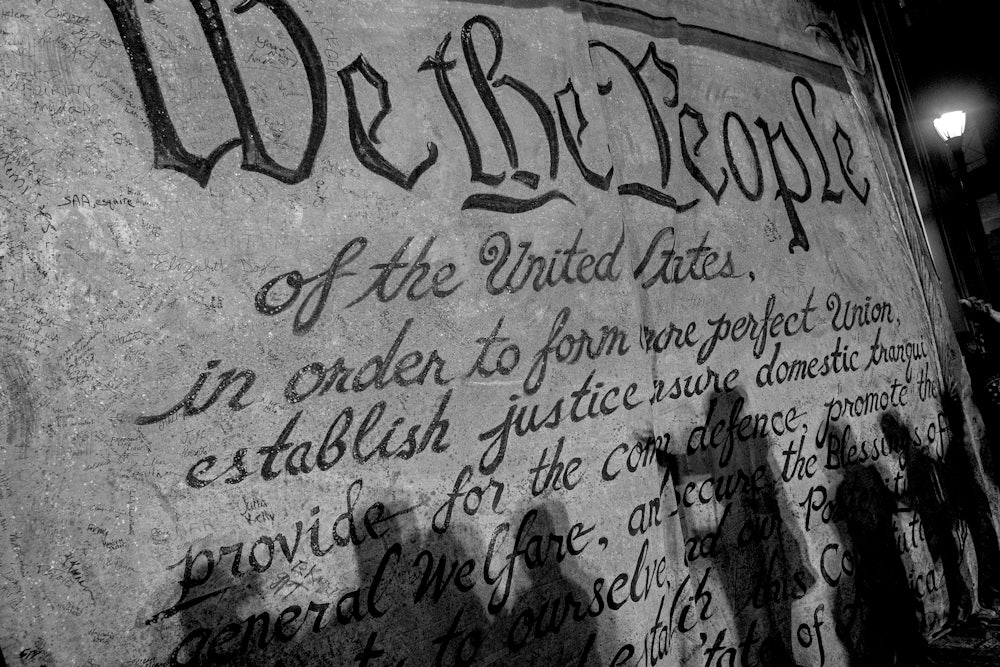In one way or another, the scholars and journalists in The New Republic’s special May issue all examine the state of democracy here or abroad. It is their work to diagnose and prognosticate, to analyze and warn. And to them, the situation is plain: Our system of government is crumbling. Around the world, autocracy looms. The tasks ahead could not be more urgent. But what of the people who are not necessarily glued to the news, whose jobs do not require them to track, in detail, every grotesque new contrivance of the Republican Party, every vain counter by the Democrats? How worried are they?
TNR’s exclusive poll suggests that nearly half of Americans are very worried indeed. Their concern does not demonstrate a strong partisan divide: 44 percent of Republicans agree with 48 percent of Democrats that our political system is in such trouble that it needs no less than major changes or even “a complete overhaul.” And respondents were not optimistic about the prospects of any such overhaul arriving: Only a quarter of Republicans and 36 percent of Democrats feel confident about how democracy will look in 10 or 20 years.
Dig a little deeper into the data, however, and it becomes clear that the two groups have “very different problems in mind,” said Guy Molyneux of Hart Research Associates, the polling firm that conducted the survey for TNR: “not only different, but in many cases even polar opposites.” Perhaps the origins of the divergence can be traced to how differently members of the political parties conceive of the nature of our government. When asked to describe what democracy means to them, 47 percent of Republicans named the protection of individual rights and liberties, while just 22 percent named majority rule—the textbook definition, it apparently does not go without saying, of a democratic political system. (By contrast, Democrats chose majority rule as their top answer, though they, too, hold a surprising diversity of beliefs on this question.)
When the survey investigated respondents’ views about what exactly threatens democracy, the distance between Republicans and Democrats came into even sharper relief. Democrats are disturbed by the growing strength of white nationalist groups, as well as by state legislatures’ increasing power to determine the outcome of presidential elections. Republicans are disturbed by mandated vaccination and mask-wearing but unbothered by the filibuster and positively cheerful about Trump’s attempts to overturn the result of the 2020 election. While they either don’t care or don’t believe that their party is making it harder to vote, they are quite worked up about Democrats committing so-called election fraud.
Interestingly, the Republican rank and file is split about what January 6, 2021, represents. Although most Republicans in our poll described the events of that day as patriotic, a hefty minority said what happened was an insurrection—a dissensus, it should be underscored, that isn’t reflected among Republican Party leadership, which has been overwhelmingly reluctant to condemn the incident. “I don’t know whether we should take a lot of comfort in knowing there are still 43 percent of Republicans who think that was wrong,” Molyneux reflected, “or despair that it’s only 43 percent.”
What, in any case, should be done to strengthen our democracy? Democrats are keen to do away with the Electoral College, increase the number of justices on the Supreme Court, and eliminate the filibuster; Republicans, not so much. They’d prefer to reduce absentee voting and limit early voting times, although what they’d most love to do is improve border security and restrict illegal immigration—a position that a high percentage of Democrats (61 percent) agrees with. A more heartening measure of common feeling can be found in the question of the Supreme Court: 59 percent of Republicans agree with 75 percent of Democrats that it would strengthen democracy to limit the number of years a justice can serve. Fixed terms, of course, would ensure that new justices are added more frequently and would give successive presidents a more comparable likelihood of appointing them. As Molyneux observed, the present system has magnified the fear the two sides have of each other, simply because the stakes are so high: “No one knows when the next vacancy might occur, and you have this arbitrary thing where some presidents get to nominate three justices and another president might not get to nominate any.”
Democrats’ relatively hard line about immigration is not the only result that suggests, for those to the left of center, that there is work to be done in educating the Democratic base: A majority of Democrats (59 percent) appear to have no problem with our present system of giving two senators to each state regardless of how populous it is—conditions that give a Wyoming resident considerably more voice than a Californian. Democrats’ comfort with the current situation, Molyneux argued, suggests that any project to move the United States closer to one person, one vote should look to other means of getting there—for example, offering statehood to Puerto Rico and Washington, D.C., two proposals that inspire broader approval among Democrats.
Given the pessimism about our political system that afflicts half the population, you might expect that people would be entertaining drastic solutions. But when asked whether the United States should split into two countries, very few from either party expect or want any such breakage. For Molyneux, this was among the more encouraging results. “As much as Americans are mad at each other,” he said, “they’re not yet ready, the large majority of them, to literally take their marbles and go to a new home.” The question is not the only one that lends itself to optimistic interpretation. A slim majority of Republicans (58 percent) consider the increasing economic power of the very wealthy to be a problem (versus 81 percent of Democrats), and a full 77 percent are troubled by the influence of big money in elections—just five percentage points fewer than Democrats.
Is there political hope in these glimmers of common ground? That, of course, remains to be seen; possibility can’t be measured by a poll. The Democratic base may need some persuading as to where the threats—and the proper remedies—really lie. At the same time, a bit of optimism might be eked from the suggestion that rank-and-file Republicans hold less anti-democratic views than many of their elected representatives. At bottom, however, this survey underscores the profound polarization of the nation. Nearly half of all Republicans and Democrats see members of the other party as threatening political enemies. While Republicans are slightly more likely to take this strong view—47 percent versus 43 percent of Democrats—the battle is clearly pitched.
If the ideal is a world in which neither party feels democracy is under siege, these warlike postures represent a grim finding. But if we accept the reality that Republicans view Democrats as a mortal threat, it’s pretty unavoidably incumbent upon Democrats to reciprocate. Perhaps we can be cheered, then, by the implacability of our fellow Americans. Read on for a deeper picture of the views of our friends, our neighbors, our political opponents—the ordinary people in whose hands the fate of our nation ultimately rests.
Democratic results in blue
Republican results in red
As you know, our federal political system and institutions are determined by the Constitution. Which of these best describes your feelings about how that system is working today?
Complete overhaul / major changes
48 44
Minor changes / working well
52 56
Which of the following comes closest to describing what democracy means to you?
Individual rights and liberties are protected
28 47
Decisions are made by a majority of citizens
39 22
The same laws apply to everyone
29 26
None of these
4 5
If the Democratic nominee is declared the winner of the next presidential election, do you think the Republicans will accept that result or work to overturn it?
Republicans will accept the result
30 67
Republicans will work to overturn the result
70 33
If the Republican nominee is declared the winner of the next presidential election, do you think the Democrats will accept that result or work to overturn it?
Democrats will accept the result
88 21
Democrats will work to overturn the result
12 79
Looking forward to the next 10 or 20 years, do you feel more confident or more worried about the future of democracy in America?
Confident
36 25
Worried
64 75
As you know, the U.S. Senate consists of two senators from each state. This gives Wyoming and Vermont, each with around 600,000 people, the same number of votes as California or Texas, which have tens of millions of people. Do you
think this system is good because it gives a voice to small states, or is bad because it violates the principle of one person/one vote?
System is good
59 72
System is bad
41 28
Some people have suggested that the United States should split into two countries, one that is more conservative or “red” and one that is more progressive or “blue.” Do you favor or oppose this idea of dividing the United States into two countries?
Strongly favor
6 7
Somewhat favor
10 12
Somewhat oppose
16 16
Strongly oppose
68 65
If the United States did split into two countries, would you prefer to live in the more conservative or “red” country or the more progressive or “blue” country?
Prefer conservative
15 89
Prefer progressive
85 11
Thinking about the people who forced their way into the U.S. Capitol on January 6, 2021, would you say that was more of an insurrection against the United States or more of an act of patriotism?
Insurrection
88 43
Act of patriotism
12 57
For each of the following, please indicate whether or not you feel this is a serious threat to democracy in America.
The influence of big money in elections
Serious threat
82 77
Not a threat
18 23The possibility of political violence
Serious threat
81 61
Not a threat
19 39Increasing economic power of the very wealthy
Serious threat
81 58
Not a threat
19 42New election laws giving state legislatures more power to determine the winner of the presidential election in their state
Serious threat
73 51
Not a threat
27 49The growing strength of white nationalist groups
Serious threat
82 38
Not a threat
18 62
Democrats committing election fraud
Serious threat
34 84
Not a threat
66 16
Donald Trump’s efforts to overturn the result of the 2020 election
Serious threat
84 19
Not a threat
16 81Filibusters in the U.S. Senate preventing the passage of legislation
Serious threat
63 39
Not a threat
37 61
Republicans making it harder for people to vote
Serious threat
85 16
Not a threat
15 84
Government mandates on vaccination and mask-wearing
Serious threat
20 60
Not a threat
80 40
Below are different proposals regarding democracy in America today. For each one, please indicate whether you think this proposal would strengthen or weaken democracy.
Improving border security and restricting illegal immigration
Strengthen democracy
61 93
Weaken democracy
39 7Limiting the number of years a U.S. Supreme Court justice could serve on the court rather than having a lifetime appointment
Strengthen democracy
75 59
Weaken democracy
25 41
Electing as president the person who receives the most votes nationally, rather than who wins a majority in the Electoral College
Strengthen democracy
84 48
Weaken democracy
16 42Making Puerto Rico a state, with representation in the U.S. House and Senate
Strengthen democracy
83 36
Weaken democracy
17 64
Eliminating the filibuster in the U.S. Senate, so that it takes a simple majority of 51 votes to pass legislation
Strengthen democracy
76 39
Weaken democracy
24 61
Making Washington, D.C., a state with representation in the U.S. House and Senate
Strengthen democracy
76 29
Weaken democracy
24 71
Increasing the number of justices on the Supreme Court
Strengthen democracy
72 30
Weaken democracy
28 70State legislation reducing absentee voting and limiting early voting times
Strengthen democracy
24 64
Weaken democracy
76 36
For full poll results and crosstabs, click the following links:
Results
Crosstabs




